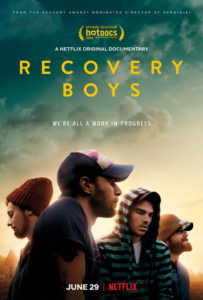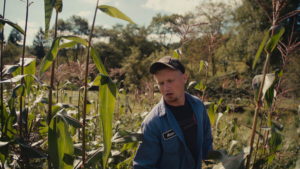Film Review: Addicts Struggle to Survive in Powerful “Recovery Boys”
Written by: Christopher Llewellyn Reed | June 28th, 2018

Recovery Boys (Elaine McMillion Sheldon, 2018) 3½ out of 4 stars.
From Elaine McMillion Sheldon, who just last year gave us the Oscar-nominated Netflix-released short documentary Heroin(e), about the opioid epidemic ravaging West Virginia (and much of the rest of the country), comes a new film, Recovery Boys—a feature, also on Netflix—about the same subject, but with a very different story and characters. Where her previous movie focused on three women at the heart of treatment efforts, this new offering points its lens at four male residents of an addiction center, struggling to rebuild their lives. Theirs is not an easy journey, and we are with them all the way in a cinematic proximity that develops into raw emotional intimacy by the end. The stakes are real; choices made lead to life or death. Forget our society’s current obsession with superheroes: this is the conflict of which powerful drama is made.
We are in the brand-new Jacob’s Ladder treatment center, in Aurora, located on a farm in the eastern part of the state, near Maryland. Our protagonists are Jeff, Rush, Adam and Ryan, each with a unique backstory that has led to the same outcome: addiction and trouble. Jeff comes straight from jail; Rush from another program; Adam from home; and Ryan from the street. As they do daily chores, working with animals and crops under the gentle guidance of the center’s founder and director, Dr. Kevin Blankenship, they lose pallor and gain vigor and muscle, gathering confidence as they go, as well. The routine, combined with group sharing sessions, seems to do the trick. Six months later, they graduate. Bravo. Life can begin again!

Not so fast. No matter the evident resources at this well-apportioned rural facility, getting over addiction is harder than merely avoiding drugs for half a year. Even the most committed soul finds that, once out on his own again, the same enablers and temptations resurface, potentially leading one down a dangerously well-traveled path. We watch, over the course of 18 months, as our four friends confront the harsh realities of post-Jacob’s Ladder life in vastly differing ways. It comes as a surprise (at least to me) who makes it and who doesn’t. One constant seems true: if you can find a community of like-minded sober individuals to support you in your recovery, then you have a better chance to remain sober, yourself. Isolation, fueled by guilt and resentment, is the great enemy of recovery. Like 12-Step Programs or not, but this is their guiding principle. Live in the company of others, or die alone.
Sheldon delivers a compelling, unscripted narrative, in which we never know what lies ahead. She leaves some questions unanswered, however, such as who funds a place like Jacob’s Ladder, which seems to offer services unavailable elsewhere (however effective, or not, they may be), or how race affects such funding (West Virginia, at least as presented here, is extremely white), or why AA and NA seem to factor so little in these addicts’ treatment plan (at least at first), but these unexamined details in no way diminish the power of the on-screen conflict. Indeed, that conflict is so terrifying to watch because it rages within each character: seeing no actual demons, we can only imagine how they manifest themselves to those fighting them off. Recovery Boys, then, whatever its limitations of perspective, offers a heart-rending exploration of one side of our nation’s growing opioid crisis, rendered in great specificity, and as such is necessary viewing for all who care about this devastating plague.


